Strategic Development Report: PepsiCo's Knowledge Management Approach
VerifiedAdded on 2020/12/18
|13
|3936
|100
Report
AI Summary
This report provides a detailed analysis of PepsiCo's strategic development, emphasizing the importance of knowledge management and organizational learning within the company. The introduction defines strategic development and highlights PepsiCo's multinational presence and product lines. The main body delves into the critical role of knowledge in achieving competitive advantages, the company's approach to strategic knowledge management, and organizational learning through management training, development, and organizational development. The report evaluates the use of strategic frameworks and tools, including SWOT analysis, the Balanced Scorecard, PESTLE analysis, and scenario planning, assessing their advantages and disadvantages. The importance of knowledge in strategic development and marketing is discussed, underscoring knowledge as intellectual capital and a key component of strategic decision-making. The report concludes by summarizing the key findings and insights regarding PepsiCo's strategic approach.
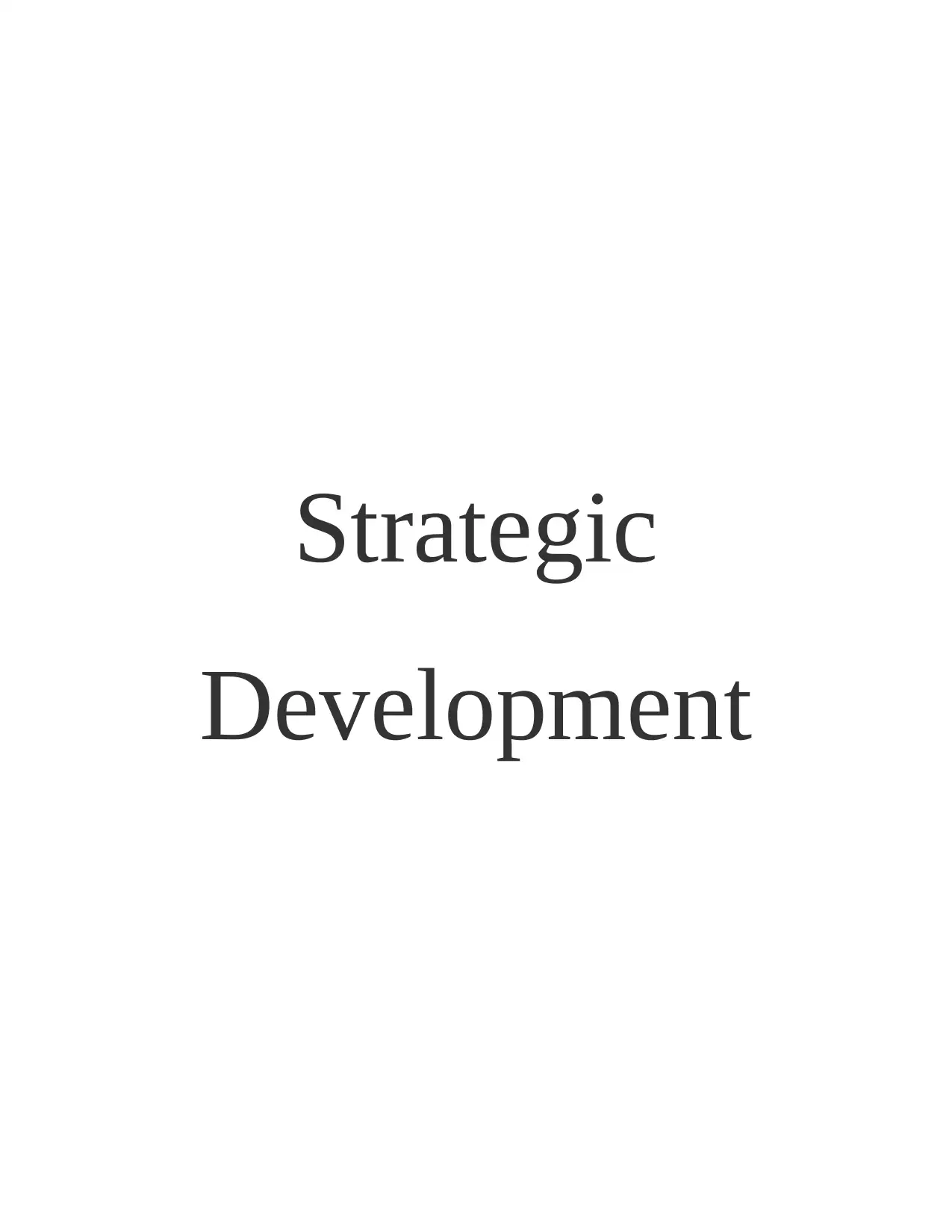
Strategic
Development
Development
Paraphrase This Document
Need a fresh take? Get an instant paraphrase of this document with our AI Paraphraser
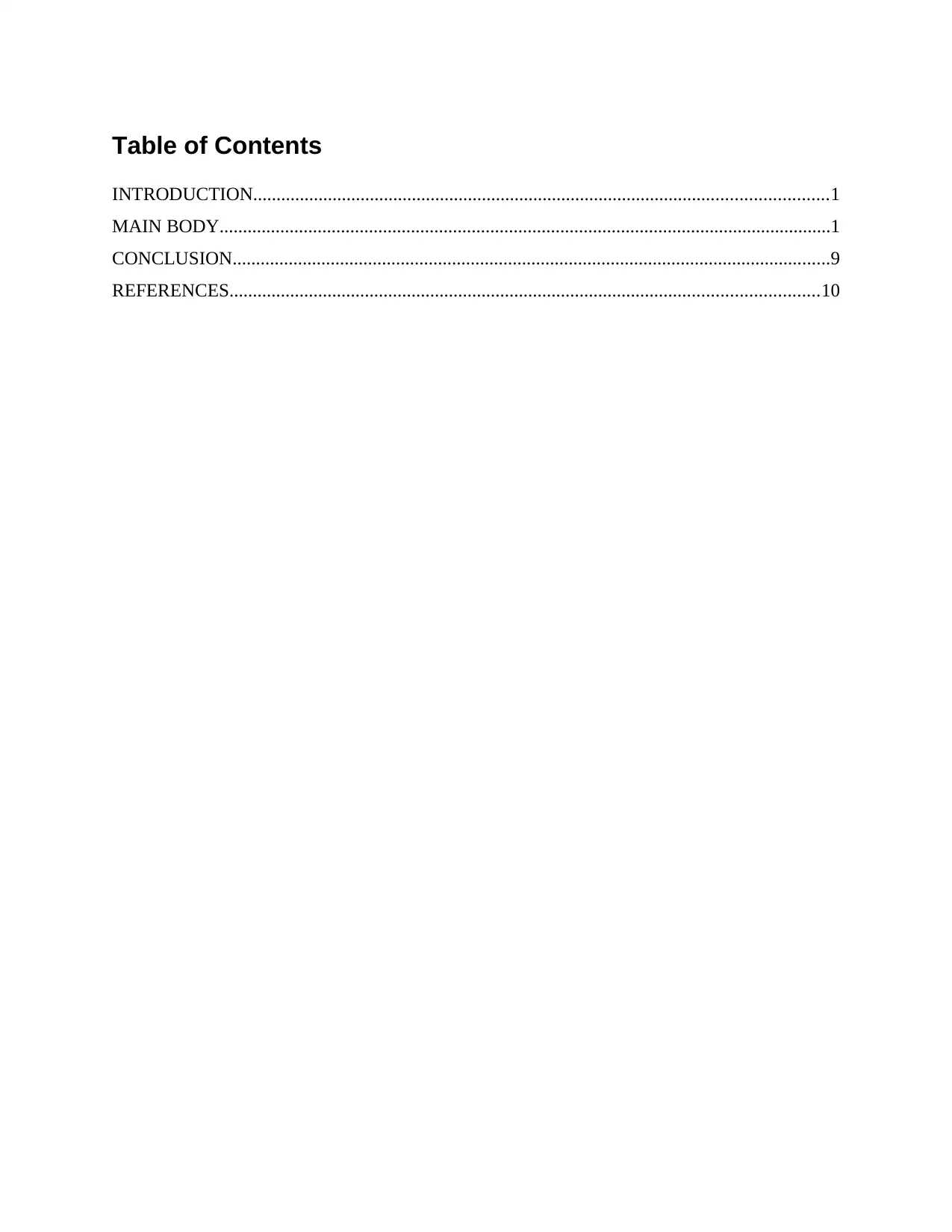
Table of Contents
INTRODUCTION...........................................................................................................................1
MAIN BODY...................................................................................................................................1
CONCLUSION................................................................................................................................9
REFERENCES..............................................................................................................................10
INTRODUCTION...........................................................................................................................1
MAIN BODY...................................................................................................................................1
CONCLUSION................................................................................................................................9
REFERENCES..............................................................................................................................10
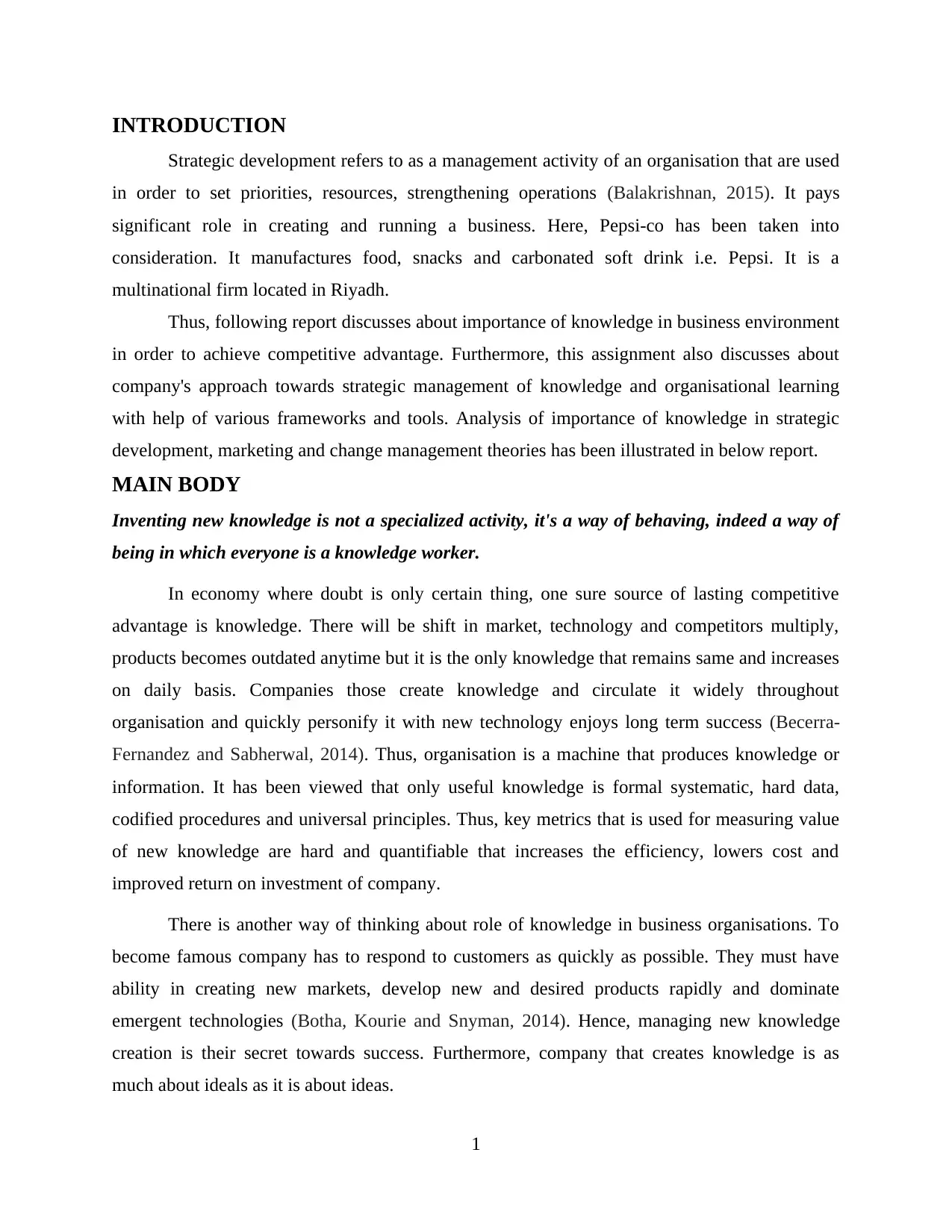
INTRODUCTION
Strategic development refers to as a management activity of an organisation that are used
in order to set priorities, resources, strengthening operations (Balakrishnan, 2015). It pays
significant role in creating and running a business. Here, Pepsi-co has been taken into
consideration. It manufactures food, snacks and carbonated soft drink i.e. Pepsi. It is a
multinational firm located in Riyadh.
Thus, following report discusses about importance of knowledge in business environment
in order to achieve competitive advantage. Furthermore, this assignment also discusses about
company's approach towards strategic management of knowledge and organisational learning
with help of various frameworks and tools. Analysis of importance of knowledge in strategic
development, marketing and change management theories has been illustrated in below report.
MAIN BODY
Inventing new knowledge is not a specialized activity, it's a way of behaving, indeed a way of
being in which everyone is a knowledge worker.
In economy where doubt is only certain thing, one sure source of lasting competitive
advantage is knowledge. There will be shift in market, technology and competitors multiply,
products becomes outdated anytime but it is the only knowledge that remains same and increases
on daily basis. Companies those create knowledge and circulate it widely throughout
organisation and quickly personify it with new technology enjoys long term success (Becerra-
Fernandez and Sabherwal, 2014). Thus, organisation is a machine that produces knowledge or
information. It has been viewed that only useful knowledge is formal systematic, hard data,
codified procedures and universal principles. Thus, key metrics that is used for measuring value
of new knowledge are hard and quantifiable that increases the efficiency, lowers cost and
improved return on investment of company.
There is another way of thinking about role of knowledge in business organisations. To
become famous company has to respond to customers as quickly as possible. They must have
ability in creating new markets, develop new and desired products rapidly and dominate
emergent technologies (Botha, Kourie and Snyman, 2014). Hence, managing new knowledge
creation is their secret towards success. Furthermore, company that creates knowledge is as
much about ideals as it is about ideas.
1
Strategic development refers to as a management activity of an organisation that are used
in order to set priorities, resources, strengthening operations (Balakrishnan, 2015). It pays
significant role in creating and running a business. Here, Pepsi-co has been taken into
consideration. It manufactures food, snacks and carbonated soft drink i.e. Pepsi. It is a
multinational firm located in Riyadh.
Thus, following report discusses about importance of knowledge in business environment
in order to achieve competitive advantage. Furthermore, this assignment also discusses about
company's approach towards strategic management of knowledge and organisational learning
with help of various frameworks and tools. Analysis of importance of knowledge in strategic
development, marketing and change management theories has been illustrated in below report.
MAIN BODY
Inventing new knowledge is not a specialized activity, it's a way of behaving, indeed a way of
being in which everyone is a knowledge worker.
In economy where doubt is only certain thing, one sure source of lasting competitive
advantage is knowledge. There will be shift in market, technology and competitors multiply,
products becomes outdated anytime but it is the only knowledge that remains same and increases
on daily basis. Companies those create knowledge and circulate it widely throughout
organisation and quickly personify it with new technology enjoys long term success (Becerra-
Fernandez and Sabherwal, 2014). Thus, organisation is a machine that produces knowledge or
information. It has been viewed that only useful knowledge is formal systematic, hard data,
codified procedures and universal principles. Thus, key metrics that is used for measuring value
of new knowledge are hard and quantifiable that increases the efficiency, lowers cost and
improved return on investment of company.
There is another way of thinking about role of knowledge in business organisations. To
become famous company has to respond to customers as quickly as possible. They must have
ability in creating new markets, develop new and desired products rapidly and dominate
emergent technologies (Botha, Kourie and Snyman, 2014). Hence, managing new knowledge
creation is their secret towards success. Furthermore, company that creates knowledge is as
much about ideals as it is about ideas.
1
⊘ This is a preview!⊘
Do you want full access?
Subscribe today to unlock all pages.

Trusted by 1+ million students worldwide
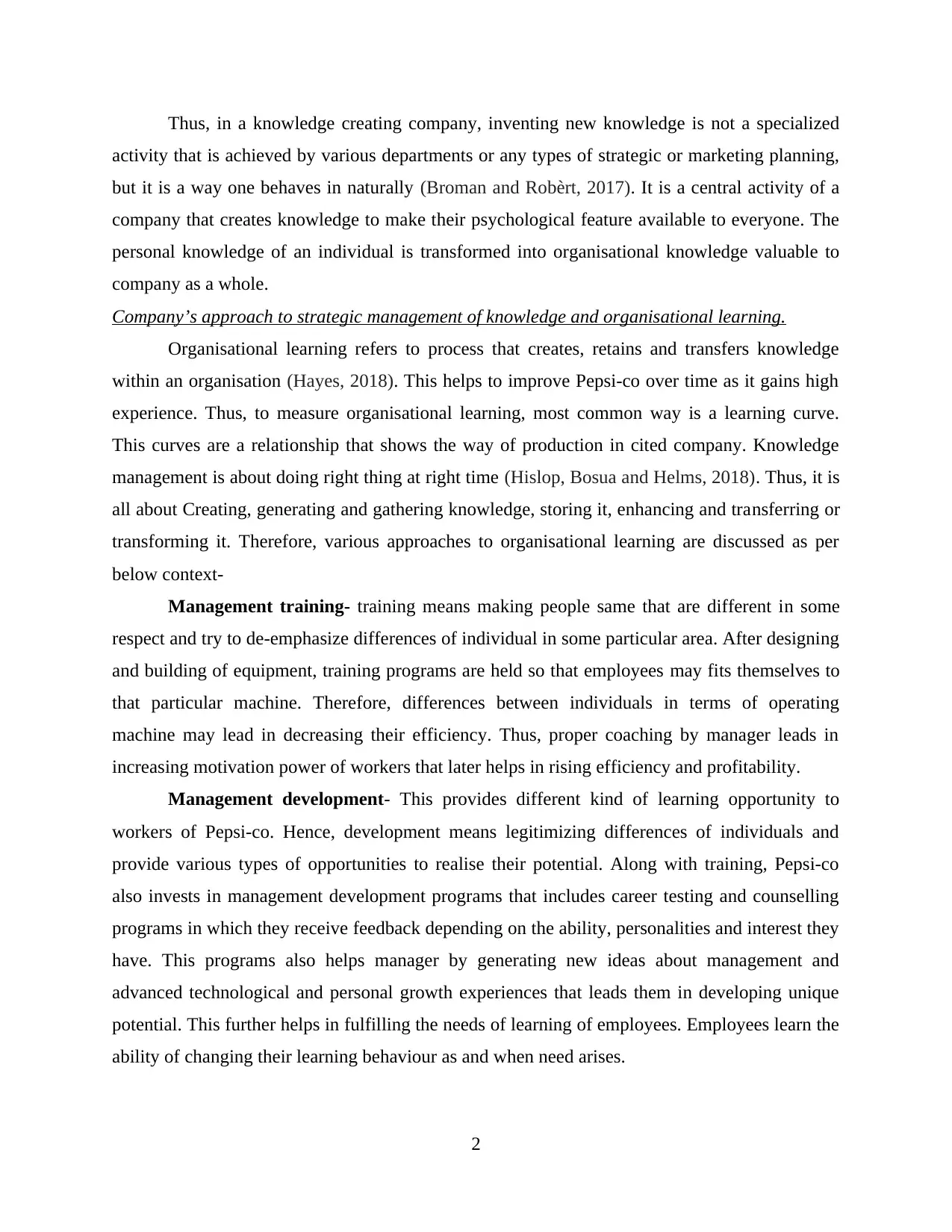
Thus, in a knowledge creating company, inventing new knowledge is not a specialized
activity that is achieved by various departments or any types of strategic or marketing planning,
but it is a way one behaves in naturally (Broman and Robèrt, 2017). It is a central activity of a
company that creates knowledge to make their psychological feature available to everyone. The
personal knowledge of an individual is transformed into organisational knowledge valuable to
company as a whole.
Company’s approach to strategic management of knowledge and organisational learning.
Organisational learning refers to process that creates, retains and transfers knowledge
within an organisation (Hayes, 2018). This helps to improve Pepsi-co over time as it gains high
experience. Thus, to measure organisational learning, most common way is a learning curve.
This curves are a relationship that shows the way of production in cited company. Knowledge
management is about doing right thing at right time (Hislop, Bosua and Helms, 2018). Thus, it is
all about Creating, generating and gathering knowledge, storing it, enhancing and transferring or
transforming it. Therefore, various approaches to organisational learning are discussed as per
below context-
Management training- training means making people same that are different in some
respect and try to de-emphasize differences of individual in some particular area. After designing
and building of equipment, training programs are held so that employees may fits themselves to
that particular machine. Therefore, differences between individuals in terms of operating
machine may lead in decreasing their efficiency. Thus, proper coaching by manager leads in
increasing motivation power of workers that later helps in rising efficiency and profitability.
Management development- This provides different kind of learning opportunity to
workers of Pepsi-co. Hence, development means legitimizing differences of individuals and
provide various types of opportunities to realise their potential. Along with training, Pepsi-co
also invests in management development programs that includes career testing and counselling
programs in which they receive feedback depending on the ability, personalities and interest they
have. This programs also helps manager by generating new ideas about management and
advanced technological and personal growth experiences that leads them in developing unique
potential. This further helps in fulfilling the needs of learning of employees. Employees learn the
ability of changing their learning behaviour as and when need arises.
2
activity that is achieved by various departments or any types of strategic or marketing planning,
but it is a way one behaves in naturally (Broman and Robèrt, 2017). It is a central activity of a
company that creates knowledge to make their psychological feature available to everyone. The
personal knowledge of an individual is transformed into organisational knowledge valuable to
company as a whole.
Company’s approach to strategic management of knowledge and organisational learning.
Organisational learning refers to process that creates, retains and transfers knowledge
within an organisation (Hayes, 2018). This helps to improve Pepsi-co over time as it gains high
experience. Thus, to measure organisational learning, most common way is a learning curve.
This curves are a relationship that shows the way of production in cited company. Knowledge
management is about doing right thing at right time (Hislop, Bosua and Helms, 2018). Thus, it is
all about Creating, generating and gathering knowledge, storing it, enhancing and transferring or
transforming it. Therefore, various approaches to organisational learning are discussed as per
below context-
Management training- training means making people same that are different in some
respect and try to de-emphasize differences of individual in some particular area. After designing
and building of equipment, training programs are held so that employees may fits themselves to
that particular machine. Therefore, differences between individuals in terms of operating
machine may lead in decreasing their efficiency. Thus, proper coaching by manager leads in
increasing motivation power of workers that later helps in rising efficiency and profitability.
Management development- This provides different kind of learning opportunity to
workers of Pepsi-co. Hence, development means legitimizing differences of individuals and
provide various types of opportunities to realise their potential. Along with training, Pepsi-co
also invests in management development programs that includes career testing and counselling
programs in which they receive feedback depending on the ability, personalities and interest they
have. This programs also helps manager by generating new ideas about management and
advanced technological and personal growth experiences that leads them in developing unique
potential. This further helps in fulfilling the needs of learning of employees. Employees learn the
ability of changing their learning behaviour as and when need arises.
2
Paraphrase This Document
Need a fresh take? Get an instant paraphrase of this document with our AI Paraphraser
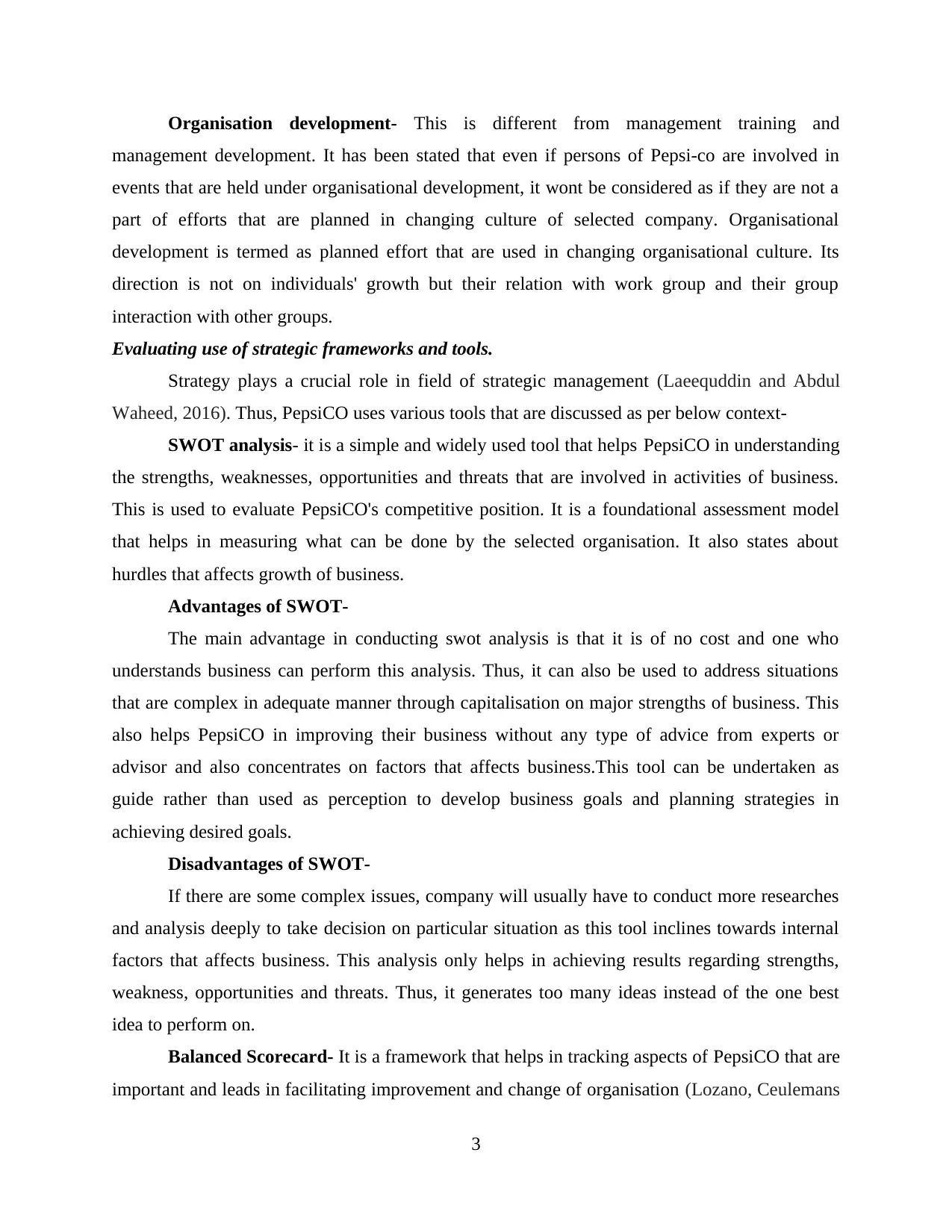
Organisation development- This is different from management training and
management development. It has been stated that even if persons of Pepsi-co are involved in
events that are held under organisational development, it wont be considered as if they are not a
part of efforts that are planned in changing culture of selected company. Organisational
development is termed as planned effort that are used in changing organisational culture. Its
direction is not on individuals' growth but their relation with work group and their group
interaction with other groups.
Evaluating use of strategic frameworks and tools.
Strategy plays a crucial role in field of strategic management (Laeequddin and Abdul
Waheed, 2016). Thus, PepsiCO uses various tools that are discussed as per below context-
SWOT analysis- it is a simple and widely used tool that helps PepsiCO in understanding
the strengths, weaknesses, opportunities and threats that are involved in activities of business.
This is used to evaluate PepsiCO's competitive position. It is a foundational assessment model
that helps in measuring what can be done by the selected organisation. It also states about
hurdles that affects growth of business.
Advantages of SWOT-
The main advantage in conducting swot analysis is that it is of no cost and one who
understands business can perform this analysis. Thus, it can also be used to address situations
that are complex in adequate manner through capitalisation on major strengths of business. This
also helps PepsiCO in improving their business without any type of advice from experts or
advisor and also concentrates on factors that affects business.This tool can be undertaken as
guide rather than used as perception to develop business goals and planning strategies in
achieving desired goals.
Disadvantages of SWOT-
If there are some complex issues, company will usually have to conduct more researches
and analysis deeply to take decision on particular situation as this tool inclines towards internal
factors that affects business. This analysis only helps in achieving results regarding strengths,
weakness, opportunities and threats. Thus, it generates too many ideas instead of the one best
idea to perform on.
Balanced Scorecard- It is a framework that helps in tracking aspects of PepsiCO that are
important and leads in facilitating improvement and change of organisation (Lozano, Ceulemans
3
management development. It has been stated that even if persons of Pepsi-co are involved in
events that are held under organisational development, it wont be considered as if they are not a
part of efforts that are planned in changing culture of selected company. Organisational
development is termed as planned effort that are used in changing organisational culture. Its
direction is not on individuals' growth but their relation with work group and their group
interaction with other groups.
Evaluating use of strategic frameworks and tools.
Strategy plays a crucial role in field of strategic management (Laeequddin and Abdul
Waheed, 2016). Thus, PepsiCO uses various tools that are discussed as per below context-
SWOT analysis- it is a simple and widely used tool that helps PepsiCO in understanding
the strengths, weaknesses, opportunities and threats that are involved in activities of business.
This is used to evaluate PepsiCO's competitive position. It is a foundational assessment model
that helps in measuring what can be done by the selected organisation. It also states about
hurdles that affects growth of business.
Advantages of SWOT-
The main advantage in conducting swot analysis is that it is of no cost and one who
understands business can perform this analysis. Thus, it can also be used to address situations
that are complex in adequate manner through capitalisation on major strengths of business. This
also helps PepsiCO in improving their business without any type of advice from experts or
advisor and also concentrates on factors that affects business.This tool can be undertaken as
guide rather than used as perception to develop business goals and planning strategies in
achieving desired goals.
Disadvantages of SWOT-
If there are some complex issues, company will usually have to conduct more researches
and analysis deeply to take decision on particular situation as this tool inclines towards internal
factors that affects business. This analysis only helps in achieving results regarding strengths,
weakness, opportunities and threats. Thus, it generates too many ideas instead of the one best
idea to perform on.
Balanced Scorecard- It is a framework that helps in tracking aspects of PepsiCO that are
important and leads in facilitating improvement and change of organisation (Lozano, Ceulemans
3
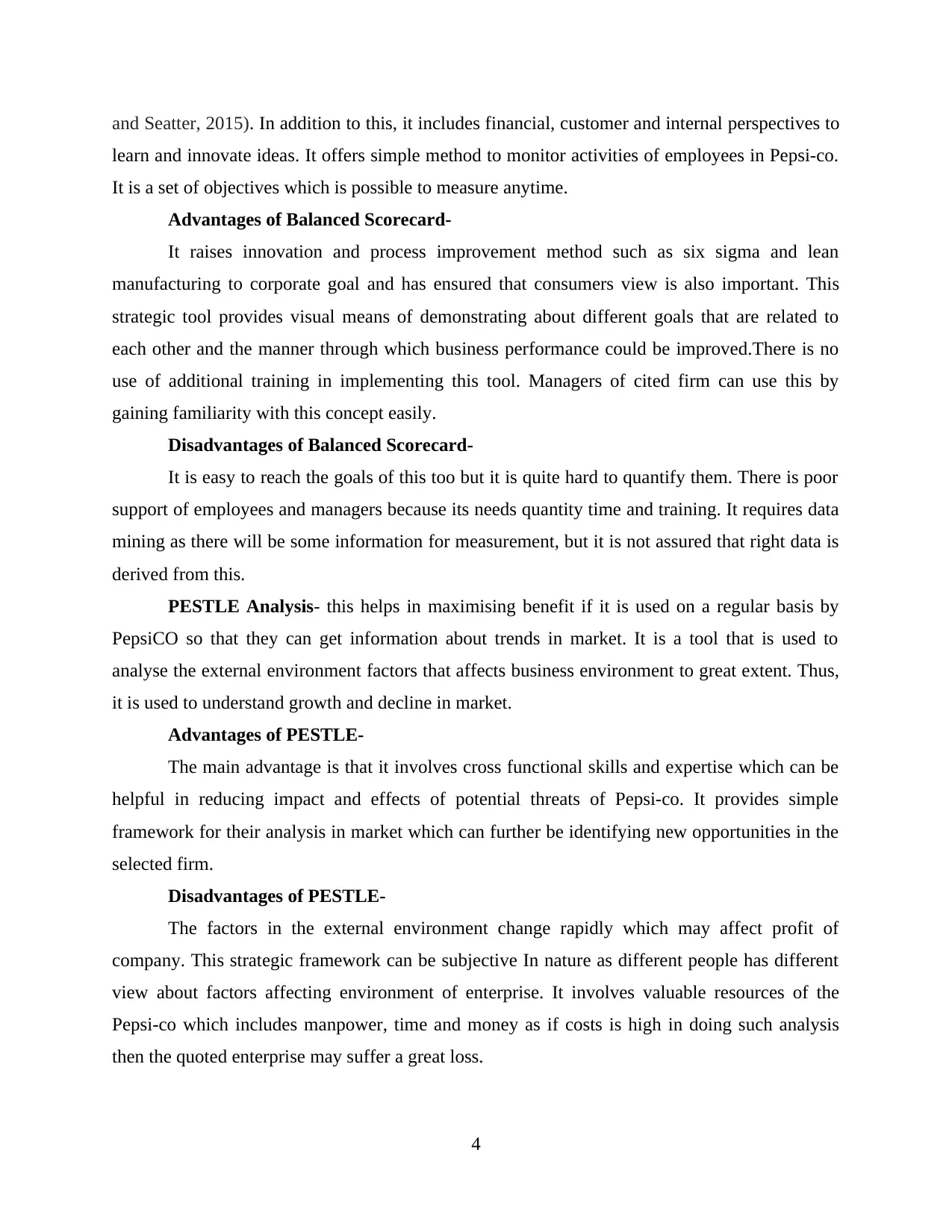
and Seatter, 2015). In addition to this, it includes financial, customer and internal perspectives to
learn and innovate ideas. It offers simple method to monitor activities of employees in Pepsi-co.
It is a set of objectives which is possible to measure anytime.
Advantages of Balanced Scorecard-
It raises innovation and process improvement method such as six sigma and lean
manufacturing to corporate goal and has ensured that consumers view is also important. This
strategic tool provides visual means of demonstrating about different goals that are related to
each other and the manner through which business performance could be improved.There is no
use of additional training in implementing this tool. Managers of cited firm can use this by
gaining familiarity with this concept easily.
Disadvantages of Balanced Scorecard-
It is easy to reach the goals of this too but it is quite hard to quantify them. There is poor
support of employees and managers because its needs quantity time and training. It requires data
mining as there will be some information for measurement, but it is not assured that right data is
derived from this.
PESTLE Analysis- this helps in maximising benefit if it is used on a regular basis by
PepsiCO so that they can get information about trends in market. It is a tool that is used to
analyse the external environment factors that affects business environment to great extent. Thus,
it is used to understand growth and decline in market.
Advantages of PESTLE-
The main advantage is that it involves cross functional skills and expertise which can be
helpful in reducing impact and effects of potential threats of Pepsi-co. It provides simple
framework for their analysis in market which can further be identifying new opportunities in the
selected firm.
Disadvantages of PESTLE-
The factors in the external environment change rapidly which may affect profit of
company. This strategic framework can be subjective In nature as different people has different
view about factors affecting environment of enterprise. It involves valuable resources of the
Pepsi-co which includes manpower, time and money as if costs is high in doing such analysis
then the quoted enterprise may suffer a great loss.
4
learn and innovate ideas. It offers simple method to monitor activities of employees in Pepsi-co.
It is a set of objectives which is possible to measure anytime.
Advantages of Balanced Scorecard-
It raises innovation and process improvement method such as six sigma and lean
manufacturing to corporate goal and has ensured that consumers view is also important. This
strategic tool provides visual means of demonstrating about different goals that are related to
each other and the manner through which business performance could be improved.There is no
use of additional training in implementing this tool. Managers of cited firm can use this by
gaining familiarity with this concept easily.
Disadvantages of Balanced Scorecard-
It is easy to reach the goals of this too but it is quite hard to quantify them. There is poor
support of employees and managers because its needs quantity time and training. It requires data
mining as there will be some information for measurement, but it is not assured that right data is
derived from this.
PESTLE Analysis- this helps in maximising benefit if it is used on a regular basis by
PepsiCO so that they can get information about trends in market. It is a tool that is used to
analyse the external environment factors that affects business environment to great extent. Thus,
it is used to understand growth and decline in market.
Advantages of PESTLE-
The main advantage is that it involves cross functional skills and expertise which can be
helpful in reducing impact and effects of potential threats of Pepsi-co. It provides simple
framework for their analysis in market which can further be identifying new opportunities in the
selected firm.
Disadvantages of PESTLE-
The factors in the external environment change rapidly which may affect profit of
company. This strategic framework can be subjective In nature as different people has different
view about factors affecting environment of enterprise. It involves valuable resources of the
Pepsi-co which includes manpower, time and money as if costs is high in doing such analysis
then the quoted enterprise may suffer a great loss.
4
⊘ This is a preview!⊘
Do you want full access?
Subscribe today to unlock all pages.

Trusted by 1+ million students worldwide
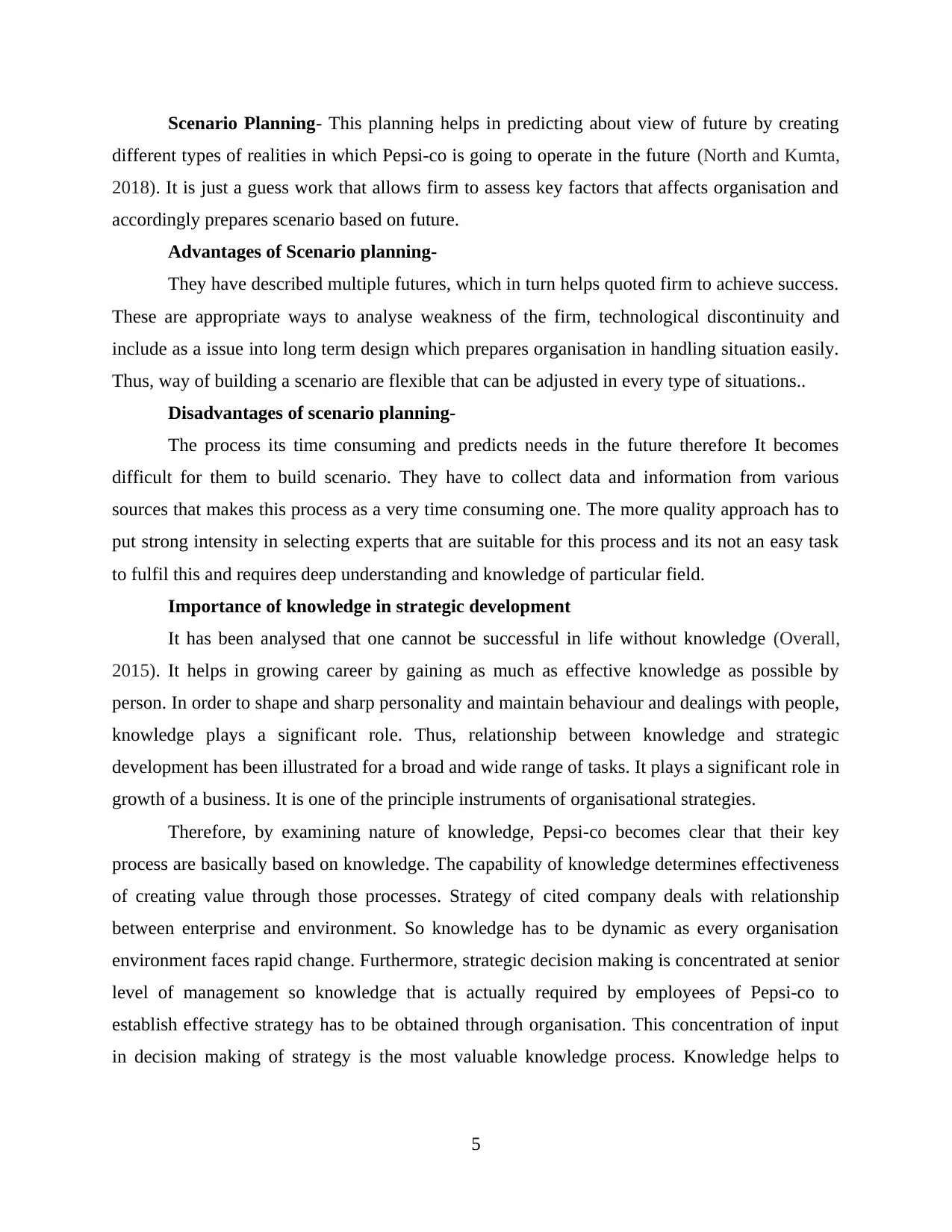
Scenario Planning- This planning helps in predicting about view of future by creating
different types of realities in which Pepsi-co is going to operate in the future (North and Kumta,
2018). It is just a guess work that allows firm to assess key factors that affects organisation and
accordingly prepares scenario based on future.
Advantages of Scenario planning-
They have described multiple futures, which in turn helps quoted firm to achieve success.
These are appropriate ways to analyse weakness of the firm, technological discontinuity and
include as a issue into long term design which prepares organisation in handling situation easily.
Thus, way of building a scenario are flexible that can be adjusted in every type of situations..
Disadvantages of scenario planning-
The process its time consuming and predicts needs in the future therefore It becomes
difficult for them to build scenario. They have to collect data and information from various
sources that makes this process as a very time consuming one. The more quality approach has to
put strong intensity in selecting experts that are suitable for this process and its not an easy task
to fulfil this and requires deep understanding and knowledge of particular field.
Importance of knowledge in strategic development
It has been analysed that one cannot be successful in life without knowledge (Overall,
2015). It helps in growing career by gaining as much as effective knowledge as possible by
person. In order to shape and sharp personality and maintain behaviour and dealings with people,
knowledge plays a significant role. Thus, relationship between knowledge and strategic
development has been illustrated for a broad and wide range of tasks. It plays a significant role in
growth of a business. It is one of the principle instruments of organisational strategies.
Therefore, by examining nature of knowledge, Pepsi-co becomes clear that their key
process are basically based on knowledge. The capability of knowledge determines effectiveness
of creating value through those processes. Strategy of cited company deals with relationship
between enterprise and environment. So knowledge has to be dynamic as every organisation
environment faces rapid change. Furthermore, strategic decision making is concentrated at senior
level of management so knowledge that is actually required by employees of Pepsi-co to
establish effective strategy has to be obtained through organisation. This concentration of input
in decision making of strategy is the most valuable knowledge process. Knowledge helps to
5
different types of realities in which Pepsi-co is going to operate in the future (North and Kumta,
2018). It is just a guess work that allows firm to assess key factors that affects organisation and
accordingly prepares scenario based on future.
Advantages of Scenario planning-
They have described multiple futures, which in turn helps quoted firm to achieve success.
These are appropriate ways to analyse weakness of the firm, technological discontinuity and
include as a issue into long term design which prepares organisation in handling situation easily.
Thus, way of building a scenario are flexible that can be adjusted in every type of situations..
Disadvantages of scenario planning-
The process its time consuming and predicts needs in the future therefore It becomes
difficult for them to build scenario. They have to collect data and information from various
sources that makes this process as a very time consuming one. The more quality approach has to
put strong intensity in selecting experts that are suitable for this process and its not an easy task
to fulfil this and requires deep understanding and knowledge of particular field.
Importance of knowledge in strategic development
It has been analysed that one cannot be successful in life without knowledge (Overall,
2015). It helps in growing career by gaining as much as effective knowledge as possible by
person. In order to shape and sharp personality and maintain behaviour and dealings with people,
knowledge plays a significant role. Thus, relationship between knowledge and strategic
development has been illustrated for a broad and wide range of tasks. It plays a significant role in
growth of a business. It is one of the principle instruments of organisational strategies.
Therefore, by examining nature of knowledge, Pepsi-co becomes clear that their key
process are basically based on knowledge. The capability of knowledge determines effectiveness
of creating value through those processes. Strategy of cited company deals with relationship
between enterprise and environment. So knowledge has to be dynamic as every organisation
environment faces rapid change. Furthermore, strategic decision making is concentrated at senior
level of management so knowledge that is actually required by employees of Pepsi-co to
establish effective strategy has to be obtained through organisation. This concentration of input
in decision making of strategy is the most valuable knowledge process. Knowledge helps to
5
Paraphrase This Document
Need a fresh take? Get an instant paraphrase of this document with our AI Paraphraser
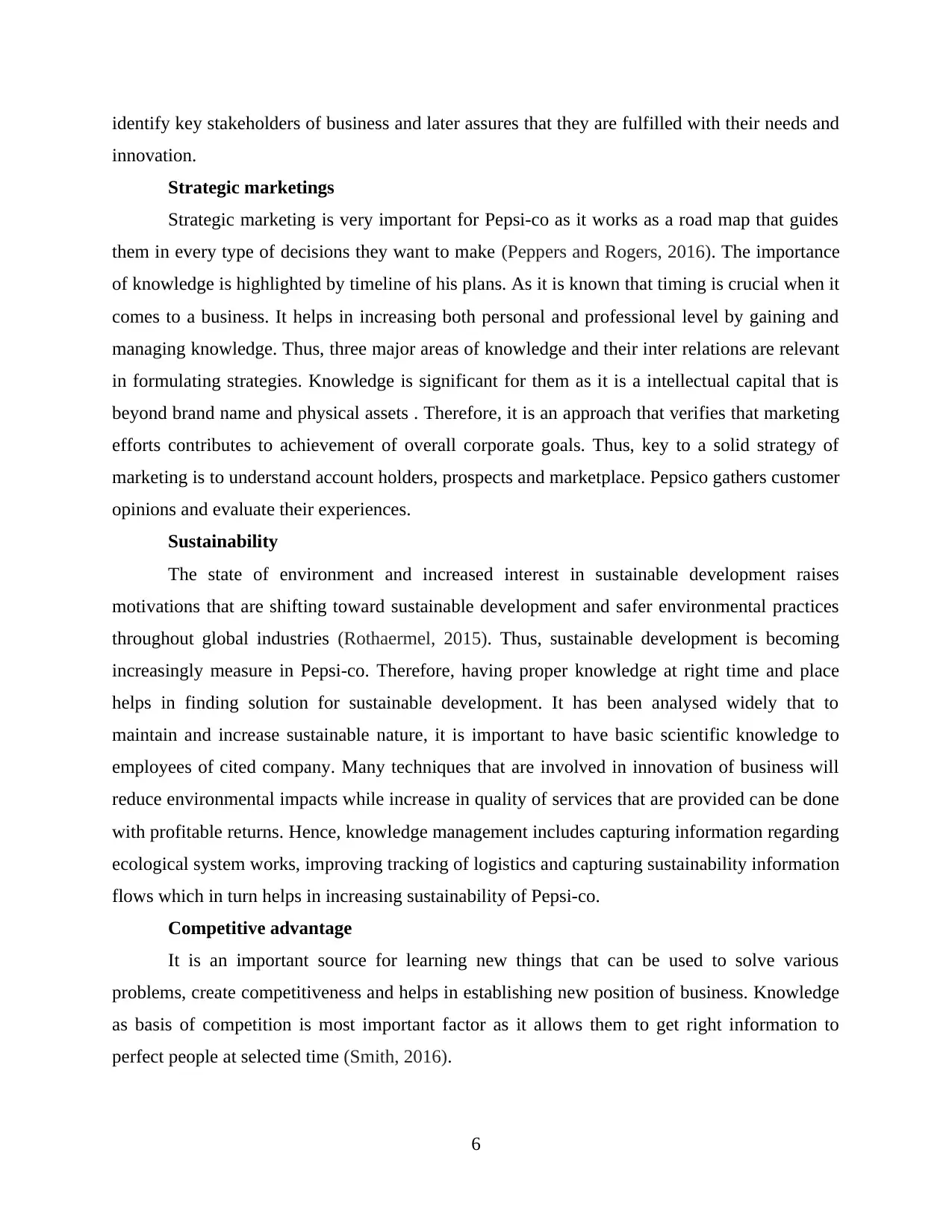
identify key stakeholders of business and later assures that they are fulfilled with their needs and
innovation.
Strategic marketings
Strategic marketing is very important for Pepsi-co as it works as a road map that guides
them in every type of decisions they want to make (Peppers and Rogers, 2016). The importance
of knowledge is highlighted by timeline of his plans. As it is known that timing is crucial when it
comes to a business. It helps in increasing both personal and professional level by gaining and
managing knowledge. Thus, three major areas of knowledge and their inter relations are relevant
in formulating strategies. Knowledge is significant for them as it is a intellectual capital that is
beyond brand name and physical assets . Therefore, it is an approach that verifies that marketing
efforts contributes to achievement of overall corporate goals. Thus, key to a solid strategy of
marketing is to understand account holders, prospects and marketplace. Pepsico gathers customer
opinions and evaluate their experiences.
Sustainability
The state of environment and increased interest in sustainable development raises
motivations that are shifting toward sustainable development and safer environmental practices
throughout global industries (Rothaermel, 2015). Thus, sustainable development is becoming
increasingly measure in Pepsi-co. Therefore, having proper knowledge at right time and place
helps in finding solution for sustainable development. It has been analysed widely that to
maintain and increase sustainable nature, it is important to have basic scientific knowledge to
employees of cited company. Many techniques that are involved in innovation of business will
reduce environmental impacts while increase in quality of services that are provided can be done
with profitable returns. Hence, knowledge management includes capturing information regarding
ecological system works, improving tracking of logistics and capturing sustainability information
flows which in turn helps in increasing sustainability of Pepsi-co.
Competitive advantage
It is an important source for learning new things that can be used to solve various
problems, create competitiveness and helps in establishing new position of business. Knowledge
as basis of competition is most important factor as it allows them to get right information to
perfect people at selected time (Smith, 2016).
6
innovation.
Strategic marketings
Strategic marketing is very important for Pepsi-co as it works as a road map that guides
them in every type of decisions they want to make (Peppers and Rogers, 2016). The importance
of knowledge is highlighted by timeline of his plans. As it is known that timing is crucial when it
comes to a business. It helps in increasing both personal and professional level by gaining and
managing knowledge. Thus, three major areas of knowledge and their inter relations are relevant
in formulating strategies. Knowledge is significant for them as it is a intellectual capital that is
beyond brand name and physical assets . Therefore, it is an approach that verifies that marketing
efforts contributes to achievement of overall corporate goals. Thus, key to a solid strategy of
marketing is to understand account holders, prospects and marketplace. Pepsico gathers customer
opinions and evaluate their experiences.
Sustainability
The state of environment and increased interest in sustainable development raises
motivations that are shifting toward sustainable development and safer environmental practices
throughout global industries (Rothaermel, 2015). Thus, sustainable development is becoming
increasingly measure in Pepsi-co. Therefore, having proper knowledge at right time and place
helps in finding solution for sustainable development. It has been analysed widely that to
maintain and increase sustainable nature, it is important to have basic scientific knowledge to
employees of cited company. Many techniques that are involved in innovation of business will
reduce environmental impacts while increase in quality of services that are provided can be done
with profitable returns. Hence, knowledge management includes capturing information regarding
ecological system works, improving tracking of logistics and capturing sustainability information
flows which in turn helps in increasing sustainability of Pepsi-co.
Competitive advantage
It is an important source for learning new things that can be used to solve various
problems, create competitiveness and helps in establishing new position of business. Knowledge
as basis of competition is most important factor as it allows them to get right information to
perfect people at selected time (Smith, 2016).
6
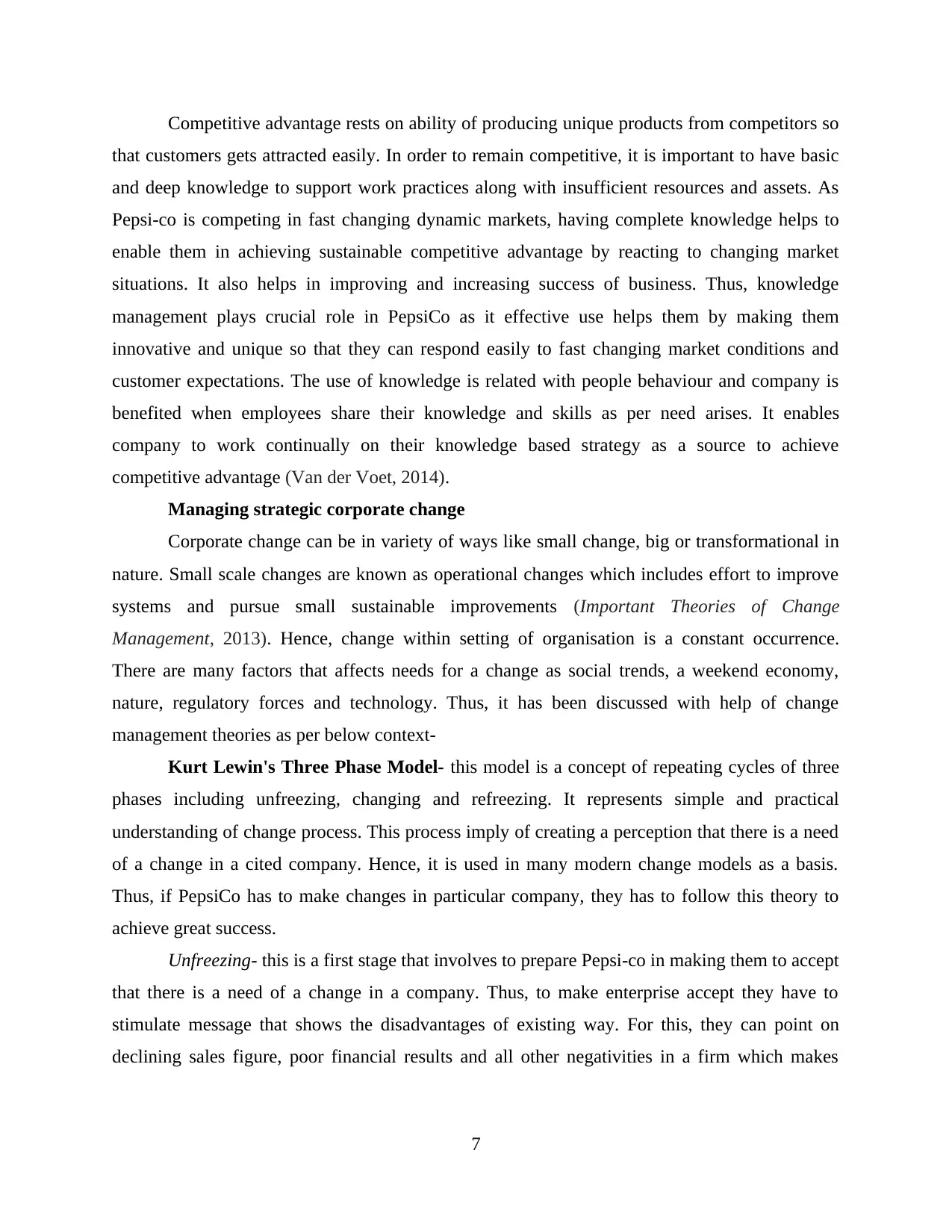
Competitive advantage rests on ability of producing unique products from competitors so
that customers gets attracted easily. In order to remain competitive, it is important to have basic
and deep knowledge to support work practices along with insufficient resources and assets. As
Pepsi-co is competing in fast changing dynamic markets, having complete knowledge helps to
enable them in achieving sustainable competitive advantage by reacting to changing market
situations. It also helps in improving and increasing success of business. Thus, knowledge
management plays crucial role in PepsiCo as it effective use helps them by making them
innovative and unique so that they can respond easily to fast changing market conditions and
customer expectations. The use of knowledge is related with people behaviour and company is
benefited when employees share their knowledge and skills as per need arises. It enables
company to work continually on their knowledge based strategy as a source to achieve
competitive advantage (Van der Voet, 2014).
Managing strategic corporate change
Corporate change can be in variety of ways like small change, big or transformational in
nature. Small scale changes are known as operational changes which includes effort to improve
systems and pursue small sustainable improvements (Important Theories of Change
Management, 2013). Hence, change within setting of organisation is a constant occurrence.
There are many factors that affects needs for a change as social trends, a weekend economy,
nature, regulatory forces and technology. Thus, it has been discussed with help of change
management theories as per below context-
Kurt Lewin's Three Phase Model- this model is a concept of repeating cycles of three
phases including unfreezing, changing and refreezing. It represents simple and practical
understanding of change process. This process imply of creating a perception that there is a need
of a change in a cited company. Hence, it is used in many modern change models as a basis.
Thus, if PepsiCo has to make changes in particular company, they has to follow this theory to
achieve great success.
Unfreezing- this is a first stage that involves to prepare Pepsi-co in making them to accept
that there is a need of a change in a company. Thus, to make enterprise accept they have to
stimulate message that shows the disadvantages of existing way. For this, they can point on
declining sales figure, poor financial results and all other negativities in a firm which makes
7
that customers gets attracted easily. In order to remain competitive, it is important to have basic
and deep knowledge to support work practices along with insufficient resources and assets. As
Pepsi-co is competing in fast changing dynamic markets, having complete knowledge helps to
enable them in achieving sustainable competitive advantage by reacting to changing market
situations. It also helps in improving and increasing success of business. Thus, knowledge
management plays crucial role in PepsiCo as it effective use helps them by making them
innovative and unique so that they can respond easily to fast changing market conditions and
customer expectations. The use of knowledge is related with people behaviour and company is
benefited when employees share their knowledge and skills as per need arises. It enables
company to work continually on their knowledge based strategy as a source to achieve
competitive advantage (Van der Voet, 2014).
Managing strategic corporate change
Corporate change can be in variety of ways like small change, big or transformational in
nature. Small scale changes are known as operational changes which includes effort to improve
systems and pursue small sustainable improvements (Important Theories of Change
Management, 2013). Hence, change within setting of organisation is a constant occurrence.
There are many factors that affects needs for a change as social trends, a weekend economy,
nature, regulatory forces and technology. Thus, it has been discussed with help of change
management theories as per below context-
Kurt Lewin's Three Phase Model- this model is a concept of repeating cycles of three
phases including unfreezing, changing and refreezing. It represents simple and practical
understanding of change process. This process imply of creating a perception that there is a need
of a change in a cited company. Hence, it is used in many modern change models as a basis.
Thus, if PepsiCo has to make changes in particular company, they has to follow this theory to
achieve great success.
Unfreezing- this is a first stage that involves to prepare Pepsi-co in making them to accept
that there is a need of a change in a company. Thus, to make enterprise accept they have to
stimulate message that shows the disadvantages of existing way. For this, they can point on
declining sales figure, poor financial results and all other negativities in a firm which makes
7
⊘ This is a preview!⊘
Do you want full access?
Subscribe today to unlock all pages.

Trusted by 1+ million students worldwide
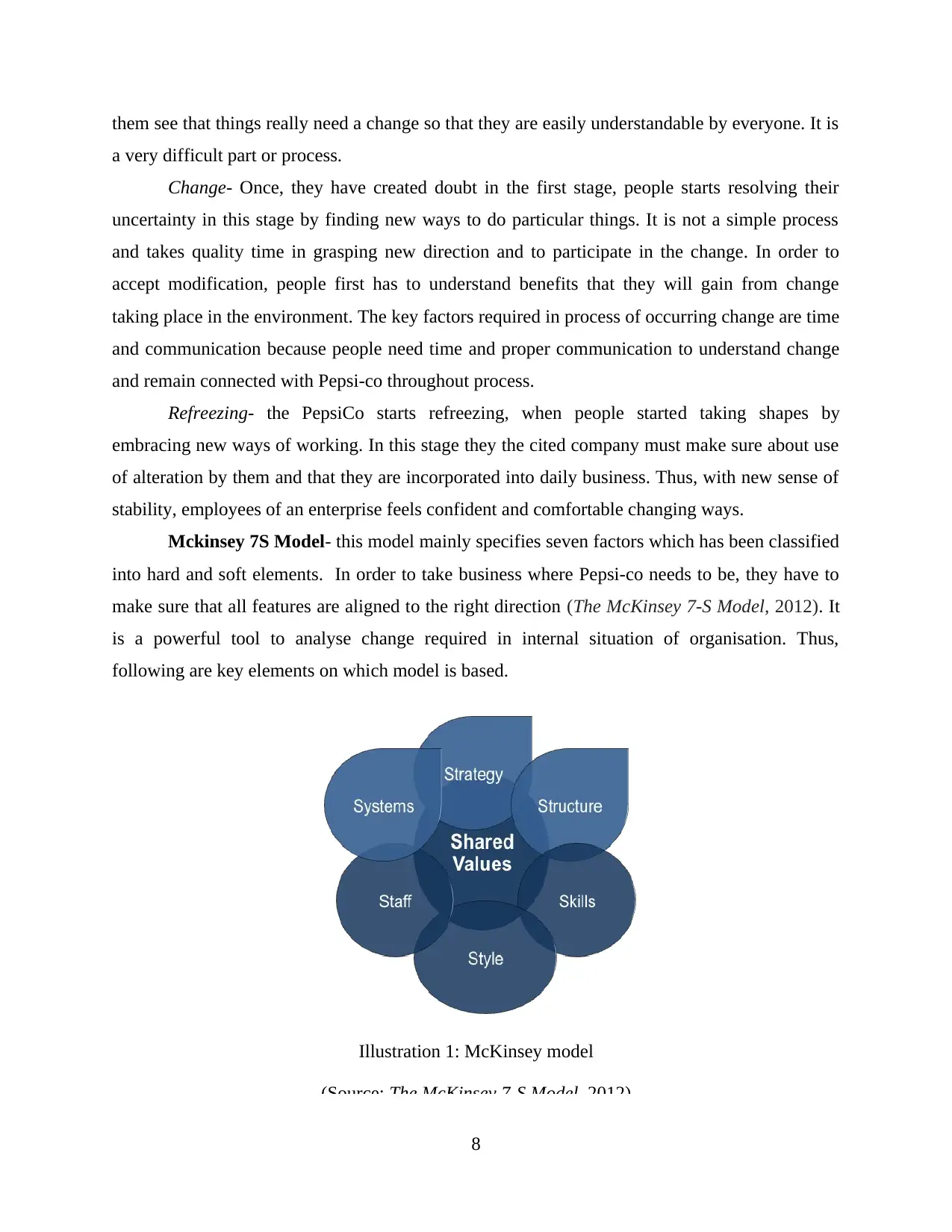
them see that things really need a change so that they are easily understandable by everyone. It is
a very difficult part or process.
Change- Once, they have created doubt in the first stage, people starts resolving their
uncertainty in this stage by finding new ways to do particular things. It is not a simple process
and takes quality time in grasping new direction and to participate in the change. In order to
accept modification, people first has to understand benefits that they will gain from change
taking place in the environment. The key factors required in process of occurring change are time
and communication because people need time and proper communication to understand change
and remain connected with Pepsi-co throughout process.
Refreezing- the PepsiCo starts refreezing, when people started taking shapes by
embracing new ways of working. In this stage they the cited company must make sure about use
of alteration by them and that they are incorporated into daily business. Thus, with new sense of
stability, employees of an enterprise feels confident and comfortable changing ways.
Mckinsey 7S Model- this model mainly specifies seven factors which has been classified
into hard and soft elements. In order to take business where Pepsi-co needs to be, they have to
make sure that all features are aligned to the right direction (The McKinsey 7-S Model, 2012). It
is a powerful tool to analyse change required in internal situation of organisation. Thus,
following are key elements on which model is based.
Illustration 1: McKinsey model
(Source: The McKinsey 7-S Model, 2012)
8
a very difficult part or process.
Change- Once, they have created doubt in the first stage, people starts resolving their
uncertainty in this stage by finding new ways to do particular things. It is not a simple process
and takes quality time in grasping new direction and to participate in the change. In order to
accept modification, people first has to understand benefits that they will gain from change
taking place in the environment. The key factors required in process of occurring change are time
and communication because people need time and proper communication to understand change
and remain connected with Pepsi-co throughout process.
Refreezing- the PepsiCo starts refreezing, when people started taking shapes by
embracing new ways of working. In this stage they the cited company must make sure about use
of alteration by them and that they are incorporated into daily business. Thus, with new sense of
stability, employees of an enterprise feels confident and comfortable changing ways.
Mckinsey 7S Model- this model mainly specifies seven factors which has been classified
into hard and soft elements. In order to take business where Pepsi-co needs to be, they have to
make sure that all features are aligned to the right direction (The McKinsey 7-S Model, 2012). It
is a powerful tool to analyse change required in internal situation of organisation. Thus,
following are key elements on which model is based.
Illustration 1: McKinsey model
(Source: The McKinsey 7-S Model, 2012)
8
Paraphrase This Document
Need a fresh take? Get an instant paraphrase of this document with our AI Paraphraser
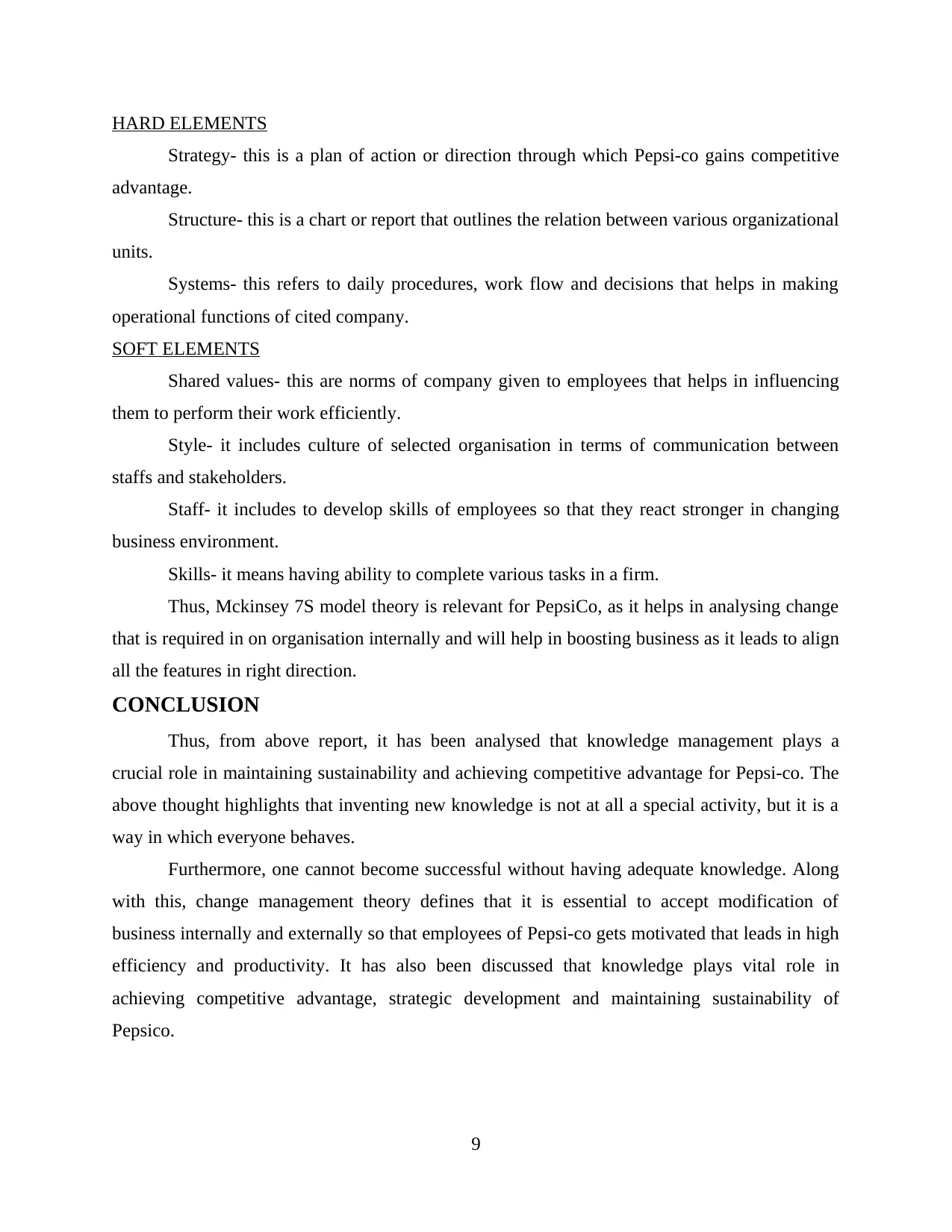
HARD ELEMENTS
Strategy- this is a plan of action or direction through which Pepsi-co gains competitive
advantage.
Structure- this is a chart or report that outlines the relation between various organizational
units.
Systems- this refers to daily procedures, work flow and decisions that helps in making
operational functions of cited company.
SOFT ELEMENTS
Shared values- this are norms of company given to employees that helps in influencing
them to perform their work efficiently.
Style- it includes culture of selected organisation in terms of communication between
staffs and stakeholders.
Staff- it includes to develop skills of employees so that they react stronger in changing
business environment.
Skills- it means having ability to complete various tasks in a firm.
Thus, Mckinsey 7S model theory is relevant for PepsiCo, as it helps in analysing change
that is required in on organisation internally and will help in boosting business as it leads to align
all the features in right direction.
CONCLUSION
Thus, from above report, it has been analysed that knowledge management plays a
crucial role in maintaining sustainability and achieving competitive advantage for Pepsi-co. The
above thought highlights that inventing new knowledge is not at all a special activity, but it is a
way in which everyone behaves.
Furthermore, one cannot become successful without having adequate knowledge. Along
with this, change management theory defines that it is essential to accept modification of
business internally and externally so that employees of Pepsi-co gets motivated that leads in high
efficiency and productivity. It has also been discussed that knowledge plays vital role in
achieving competitive advantage, strategic development and maintaining sustainability of
Pepsico.
9
Strategy- this is a plan of action or direction through which Pepsi-co gains competitive
advantage.
Structure- this is a chart or report that outlines the relation between various organizational
units.
Systems- this refers to daily procedures, work flow and decisions that helps in making
operational functions of cited company.
SOFT ELEMENTS
Shared values- this are norms of company given to employees that helps in influencing
them to perform their work efficiently.
Style- it includes culture of selected organisation in terms of communication between
staffs and stakeholders.
Staff- it includes to develop skills of employees so that they react stronger in changing
business environment.
Skills- it means having ability to complete various tasks in a firm.
Thus, Mckinsey 7S model theory is relevant for PepsiCo, as it helps in analysing change
that is required in on organisation internally and will help in boosting business as it leads to align
all the features in right direction.
CONCLUSION
Thus, from above report, it has been analysed that knowledge management plays a
crucial role in maintaining sustainability and achieving competitive advantage for Pepsi-co. The
above thought highlights that inventing new knowledge is not at all a special activity, but it is a
way in which everyone behaves.
Furthermore, one cannot become successful without having adequate knowledge. Along
with this, change management theory defines that it is essential to accept modification of
business internally and externally so that employees of Pepsi-co gets motivated that leads in high
efficiency and productivity. It has also been discussed that knowledge plays vital role in
achieving competitive advantage, strategic development and maintaining sustainability of
Pepsico.
9
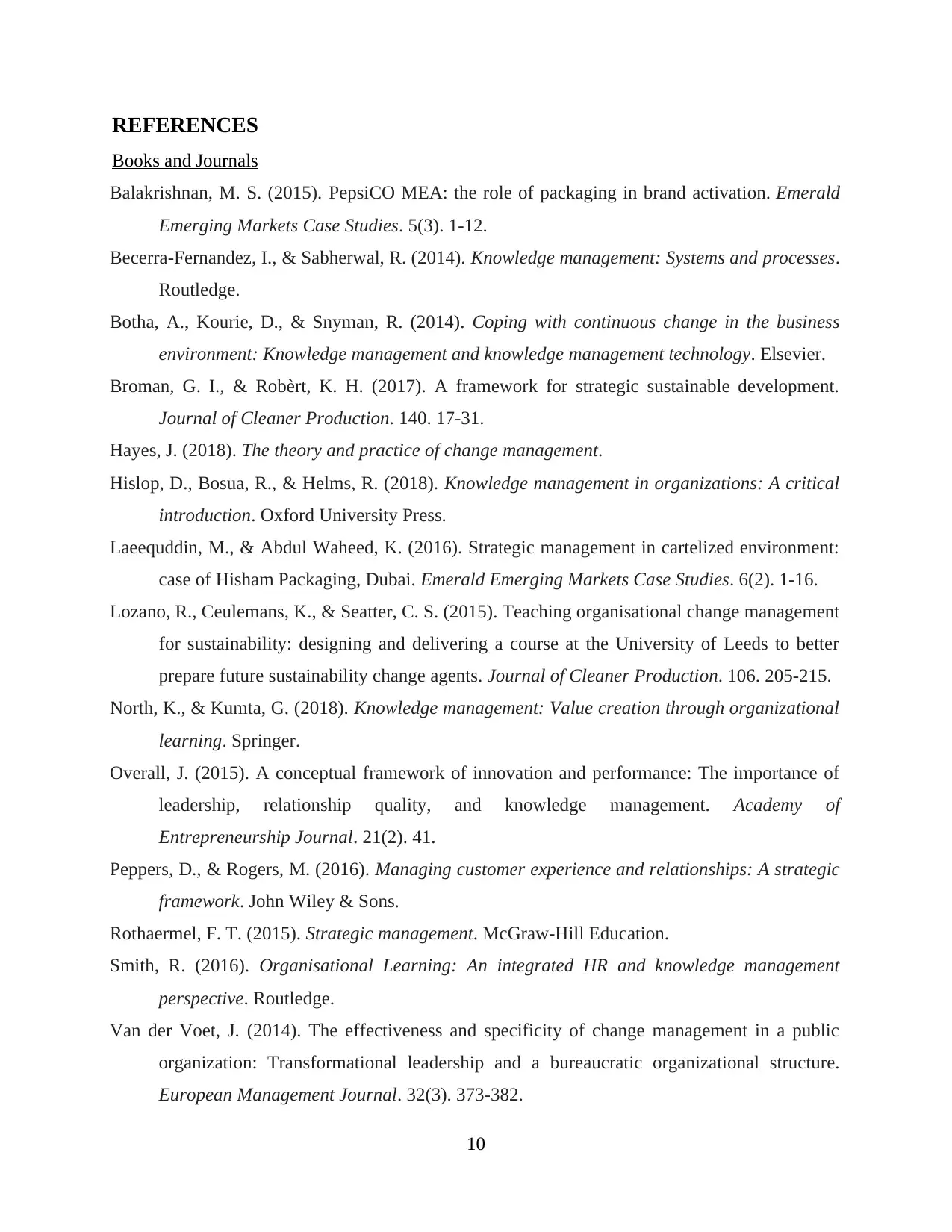
REFERENCES
Books and Journals
Balakrishnan, M. S. (2015). PepsiCO MEA: the role of packaging in brand activation. Emerald
Emerging Markets Case Studies. 5(3). 1-12.
Becerra-Fernandez, I., & Sabherwal, R. (2014). Knowledge management: Systems and processes.
Routledge.
Botha, A., Kourie, D., & Snyman, R. (2014). Coping with continuous change in the business
environment: Knowledge management and knowledge management technology. Elsevier.
Broman, G. I., & Robèrt, K. H. (2017). A framework for strategic sustainable development.
Journal of Cleaner Production. 140. 17-31.
Hayes, J. (2018). The theory and practice of change management.
Hislop, D., Bosua, R., & Helms, R. (2018). Knowledge management in organizations: A critical
introduction. Oxford University Press.
Laeequddin, M., & Abdul Waheed, K. (2016). Strategic management in cartelized environment:
case of Hisham Packaging, Dubai. Emerald Emerging Markets Case Studies. 6(2). 1-16.
Lozano, R., Ceulemans, K., & Seatter, C. S. (2015). Teaching organisational change management
for sustainability: designing and delivering a course at the University of Leeds to better
prepare future sustainability change agents. Journal of Cleaner Production. 106. 205-215.
North, K., & Kumta, G. (2018). Knowledge management: Value creation through organizational
learning. Springer.
Overall, J. (2015). A conceptual framework of innovation and performance: The importance of
leadership, relationship quality, and knowledge management. Academy of
Entrepreneurship Journal. 21(2). 41.
Peppers, D., & Rogers, M. (2016). Managing customer experience and relationships: A strategic
framework. John Wiley & Sons.
Rothaermel, F. T. (2015). Strategic management. McGraw-Hill Education.
Smith, R. (2016). Organisational Learning: An integrated HR and knowledge management
perspective. Routledge.
Van der Voet, J. (2014). The effectiveness and specificity of change management in a public
organization: Transformational leadership and a bureaucratic organizational structure.
European Management Journal. 32(3). 373-382.
10
Books and Journals
Balakrishnan, M. S. (2015). PepsiCO MEA: the role of packaging in brand activation. Emerald
Emerging Markets Case Studies. 5(3). 1-12.
Becerra-Fernandez, I., & Sabherwal, R. (2014). Knowledge management: Systems and processes.
Routledge.
Botha, A., Kourie, D., & Snyman, R. (2014). Coping with continuous change in the business
environment: Knowledge management and knowledge management technology. Elsevier.
Broman, G. I., & Robèrt, K. H. (2017). A framework for strategic sustainable development.
Journal of Cleaner Production. 140. 17-31.
Hayes, J. (2018). The theory and practice of change management.
Hislop, D., Bosua, R., & Helms, R. (2018). Knowledge management in organizations: A critical
introduction. Oxford University Press.
Laeequddin, M., & Abdul Waheed, K. (2016). Strategic management in cartelized environment:
case of Hisham Packaging, Dubai. Emerald Emerging Markets Case Studies. 6(2). 1-16.
Lozano, R., Ceulemans, K., & Seatter, C. S. (2015). Teaching organisational change management
for sustainability: designing and delivering a course at the University of Leeds to better
prepare future sustainability change agents. Journal of Cleaner Production. 106. 205-215.
North, K., & Kumta, G. (2018). Knowledge management: Value creation through organizational
learning. Springer.
Overall, J. (2015). A conceptual framework of innovation and performance: The importance of
leadership, relationship quality, and knowledge management. Academy of
Entrepreneurship Journal. 21(2). 41.
Peppers, D., & Rogers, M. (2016). Managing customer experience and relationships: A strategic
framework. John Wiley & Sons.
Rothaermel, F. T. (2015). Strategic management. McGraw-Hill Education.
Smith, R. (2016). Organisational Learning: An integrated HR and knowledge management
perspective. Routledge.
Van der Voet, J. (2014). The effectiveness and specificity of change management in a public
organization: Transformational leadership and a bureaucratic organizational structure.
European Management Journal. 32(3). 373-382.
10
⊘ This is a preview!⊘
Do you want full access?
Subscribe today to unlock all pages.

Trusted by 1+ million students worldwide
1 out of 13
Related Documents
Your All-in-One AI-Powered Toolkit for Academic Success.
+13062052269
info@desklib.com
Available 24*7 on WhatsApp / Email
![[object Object]](/_next/static/media/star-bottom.7253800d.svg)
Unlock your academic potential
Copyright © 2020–2025 A2Z Services. All Rights Reserved. Developed and managed by ZUCOL.





